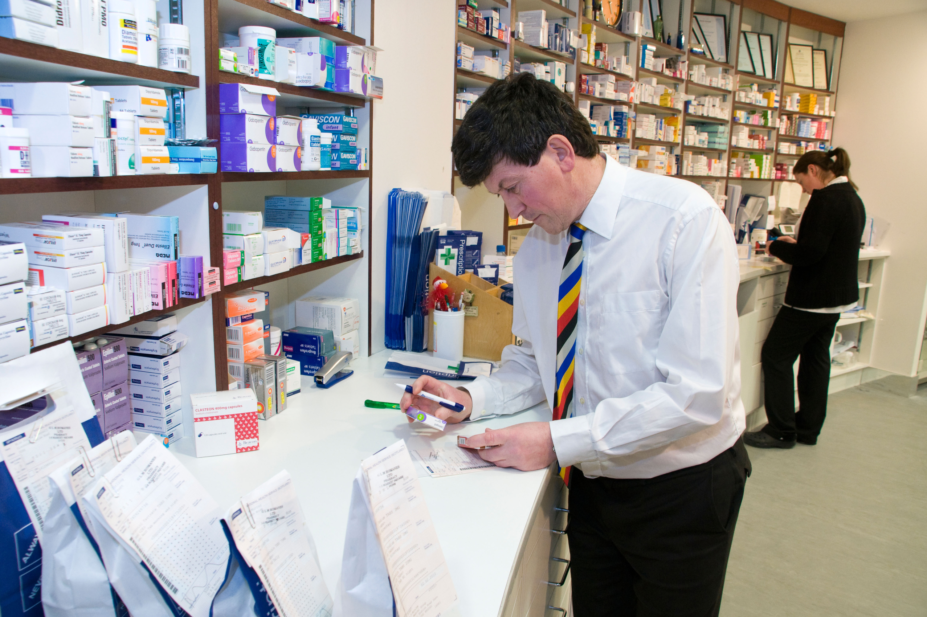
Alamy.com
After years spent bubbling under the surface, a debate over supervision reignited when a government committee said it was “generally supportive, in principle” of proposals from the Short Life Working Group on supervision to allow pharmacy technicians to take on delegated responsibility for the sale and supply of prescription-only and pharmacy medicines.
Now, more than four years since the government’s Rebalancing Medicines Legislation and Pharmacy Regulation Programme Board tentatively supported the proposals, and more than two years into the five-year ‘Community pharmacy contractual framework’, which hinted that a change in supervision legislation could be back on the cards, discussions have sprung back to life.
But this time, talks are being led by representative bodies of pharmacy employers — the Association of Independent Multiple Pharmacies, the Company Chemists’ Association and the National Pharmacy Association — which have said they “are not considering remote supervision” and are instead seeking a greater “pharmacist presence in the pharmacy”.
What is supervision?
‘Supervision’ is the term used in Regulation 220 of the Human Medicines Regulations 2012, which says that a person must not sell a medicinal product unless that person is a pharmacist, or unless “the transaction is carried out on [the person’s] behalf by another person, that other person is, or acts under the supervision of, a pharmacist”. However, there are many interpretations of what this means in practice.
Why is supervision so controversial?
The primary concern is patient safety. In September 2017, the RPS published an eight-point position statement on the role of registered technicians supervising the sale and supply of medicines. It concluded that “access to a pharmacist and their ability to provide clinical assurance for safety in community pharmacies is absolutely essential”.
But, crucially, the legislation includes no single definition of what ‘supervision’ actually means. It could be interpreted to mean that pharmacists must remain on-site monitoring and directly observing prescriptions being prepared for every patient. Or it could be interpreted to mean that clinical checks and an awareness of what is being dispensed would suffice.
Case law over the past 60 years has also ultimately failed to come to one definitive conclusion.
The earliest case in which supervision was discussed in the courts was in the 1943 case of Roberts vs. Littlewoods Mail Order Stores Ltd, when Littlewoods stores, which had contained pharmacies, did not have a pharmacist for every store. The court concluded that a pharmacist has to be present in the store, so they know what’s being sold and are in a position to intervene.
However, much later, a non-pharmacy case in 2010 — Summers vs. Congreve Horner & Co — looked at the supervision of a surveyor’s report and concluded that supervision is a matter of fact and degree, and therefore should be looked at on a case-by-case basis.
Without further clarification of what supervision means, it becomes difficult to properly debate the ramifications of any proposed changes to legislation.
How will this affect my pharmacy?
Proponents for broadening the supervisory role to other pharmacy staff have argued that in doing so, pharmacists would be able to manage more patients with long-term conditions, for example, which requires them to spend time in a consultation room, or visit care homes which do not have a pharmacist on site.
Therefore, by allowing other pharmacy professionals to take on the supervisory role, pharmacists would then be able to have more flexibility in their job to undertake more patient-facing care rather than having to observe the supply of medicines in the dispensary.
However, it all depends on an individual pharmacist’s interpretation of the word ‘supervision’ as explained above. It could mean no change for you and your pharmacy if your interpretation already allows for this kind of expanded role. A definitive answer to this is still to come.
Why change things at all?
The argument goes that legislation needs to be relaxed to allow pharmacists to delegate agreed tasks to other qualified pharmacy staff — freeing up time for more patient-facing care.
Those who support relaxing supervision rules warn that pharmacists would have to spend increasing amounts of time in the dispensary as patient demand rises. With less time available, pharmacists could then be prevented from integrating with other healthcare systems such as the primary care networks announced in the ‘NHS Long Term Plan’, published in January 2019.
The answer to supervision could be finding a middle ground in which a pharmacist can leave the shop floor for a short period of time while another pharmacy professional carries out certain delegated activities that have been agreed in advance. It is possible that after all this debate, there may be no need for legislative change, just clarification on its definition.
The RPS previously warned in its eight-point position statement that any changes to the law must “ensure the pharmacist always has the opportunity to undertake the clinical assessment or check, and that any new law does not have gaps where this could potentially be bypassed”.
What are the risks?
Martin Astbury, community pharmacist and member of the RPS English Pharmacy Board, argued in the December 2018 issue of The Pharmaceutical Journal that community pharmacy’s role in healthcare would be eroded “if we lower the bar of clinical intervention”.
Relaxing supervision requirements might also open the doors to “remote supervision”, which could see pharmacists operating a pharmacy from afar by clinically checking prescriptions remotely online and advising or assessing patients using video consultation services.
The Pharmacists’ Defence Association (PDA) has long campaigned against remote supervision arguing that if this becomes a legally available option some employers could attempt to cut costs by operating their pharmacies without a pharmacist, putting patient safety at risk.
Concerns over remote supervision have been heightened following the government consultation ‘Pharmacy legislation on dispensing errors and organisational governance’. It includes proposals for the General Pharmaceutical Council (GPhC) to set regulations relating to the role of the Responsible Pharmacist.
The PDA has also said that the government’s proposals to give pharmacy regulators powers over the regulation of Responsible Pharmacists and remove “specific ministerial regulation-making powers in respect of … the Responsible Pharmacist and supervision … could lead to remote supervision in registered pharmacies”.
However, after all 632 responses to the consultation were considered by the rebalancing board, its chair, Ken Jarrold, said in a statement that respondents had taken “the opportunity to raise issues and concerns which were not linked to the proposals that we were consulting on”.
He added that supervision “was one of these” and clarified that the changes laid out in the draft legislation “will not change any of the requirements around transactional governance”.
The government proposal document itself also notes that the supervision “of sale and supply of medicines, as a general issue, is covered by part 12 of the Human Medicines Regulations 2012, and nothing in this order will impact upon the requirements in part 12 of those regulations”.
The document adds that it requires the GPhC to publish and consult on any draft rules it draws up.
Are pharmacy technicians qualified to take on a supervisory role?
The Association of Pharmacy Technicians UK (APTUK) says there is “strong evidence” that technicians can take on final accuracy checking, medicines management and pharmacy management roles more widely without increasing risks.
Indeed, Health Education England and the Centre for Pharmacy Postgraduate Education have developed an accuracy checking pharmacy technician pilot programme to equip pharmacy technicians in London, Kent, Surrey and Sussex with the knowledge and skills to undertake the final accuracy check of dispensed items.
In a 2016 position statement, the APTUK said that pharmacy technicians “processing and handing out” new and repeat prescriptions pose no risk, “providing a clinical check has taken place” by a pharmacist.
But it adds that any delegation must be preceded by a risk assessment — whether this is a written document or an on-the-spot professional judgement — and technicians will need to be aware of “the limits of their competence and refer to a pharmacist when necessary”.
The National Pharmacy Association (NPA), however, called on the government in February 2018, to rule out proposals that would allow pharmacy technicians to take on the supply of prescription-only medicines after a government report found that medication errors were leading to thousands of deaths each year.
The NPA had previously said that supervision rules should only be relaxed if, among other factors, technicians “understand and are supportive of any new responsibilities and roles that may be proposed for them”.
On 20 November 2018, the APTUK opened a consultation for its members to express their views on supervision in an effort to update its position statement.
The Department of Health and Social Care told The Pharmaceutical Journal on 30 July 2019 that, following a commitment to improve skill mix in the five-year community pharmacy contract, it plans to look at how legislation and practice can be updated to allow pharmacy technicians to take more of a role in dispensing.
What happens next?
Currently, there is not a targeted end-date for when the supervision issue will be resolved.
In May 2021, the Association of Independent Multiple Pharmacies, the Company Chemists’ Association and the National Pharmacy Association said they were setting up a steering group to restart discussions around supervision.
“There is a broad consensus that some elements of supervision may need refreshing to take account of current and emerging pharmacy practice. We are not considering remote supervision,” they said at the time. “In fact, we want the pharmacist presence in the pharmacy to become more, not less, visible to patients.”
The RPS said that it “will be directly involved in any discussions about proposed changes to legislation around pharmacy supervision speaking for our members and the public who depend on pharmacy services”.
“Pharmacists must be at the centre of all pharmaceutical services recognising their unique role in helping to keep the public safe,” a spokesperson for the RPS said.
“The increasing clinical role and service provision we are seeing from community pharmacies must continue to grow at pace, including enabling patients to have better access to pharmacist independent prescribers within their communities.”
The RPS had initially planned to consult its members in 2017 on what they think supervision is and what it should be, with the results of the consultation then informing the RPS’s position when the rebalancing board next discussed supervision.
Before the COVID-19 pandemic, the Department of Health and Social Care (DHSC) said the rebalancing board is in ‘listening mode’ to inform future discussion on supervision and is prioritising its work on dispensing errors and organisational governance.
The rebalancing board confirmed in February 2019 that it is “is not actively considering supervision at this time”.
The rebalancing board will eventually discuss what supervision looks like, what the proposals are and what happens next. According to the DHSC, the board will ultimately provide any clarification on the definition of supervision.
Depending on the outcome of some of these elements, the board may say that nothing more needs to be done on this, or that some legislative change needs to occur. The board will then draw up a series of proposals, which will go out for consultation to the wider profession.
Key dates
April 2016: The Rebalancing Medicines Legislation and Pharmacy Regulation Programme Board said it was “generally supportive” of proposals allowing technicians to take on supervision role
October 2017: The Royal Pharmaceutical Society (RPS) announces plans to consult the profession pharmacy supervision
November 2018: The Association of Pharmacy Technicians UK (APTUK) consultation on supervision opens
January 2019: The APTUK survey closed
May 2021: Community pharmacy employer representative bodies restart discussions around supervision
Key quotes
Ken Jarrold, chair of the Rebalancing Board: “Supervision is a very sensitive issue because it comes to the heart of what pharmacists feel about themselves and about the future, and that is why we have got to approach it carefully.”
Mark Koziol, chair of the Pharmacists’ Defence Association: “The COVID-19 pandemic has produced a once in a generation opportunity for greater recognition of community pharmacy, but this surely must be based upon the greater availability of the pharmacist”.
A joint statement from the Association of Independent Multiple Pharmacies, Company Chemists’ Association and the NPA: “There is a broad consensus that some elements of supervision may need refreshing to take account of current and emerging pharmacy practice. We are not considering remote supervision”.
Further reading
Should the law change to allow more flexible pharmacy supervision? — https://pharmaceutical-journal.com/article/opinion/should-the-law-change-to-allow-more-flexible-pharmacy-supervision
Pharmacy supervision — For and Against — https://www.npa.co.uk/news-and-events/npa-tv/pharmacy-supervision-for-and-against/
The Human Medicines Regulations 2012 — http://www.legislation.gov.uk/uksi/2012/1916/pdfs/uksi_20121916_en.pdf
APTUK’s Key Facts of ‘Supervision’ — http://www.aptuk.org/static/pdf/bb306efbc39ab1050072e32ac7884ae1.pdf


